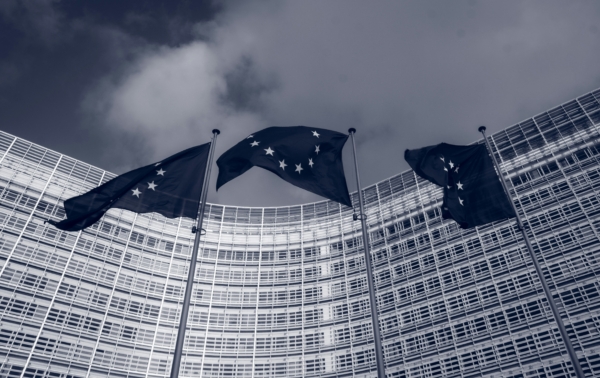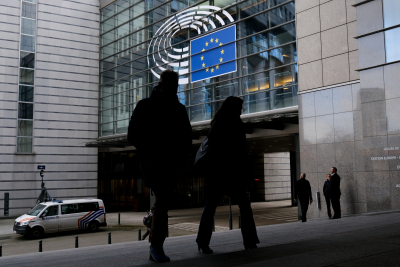This week’s Uber Files investigation by the Guardian and the ICIJ revealed how Uber arranged lobby meetings with national and EU politicians with the help of a former EU Commissioner who was banned by the Commission’s own rules from doing so. This revelation comes hot on the heels of the scandal of deleted text messages between President von der Leyen and the CEO of Pfizer at the height of the COVID crisis. This has prompted us to take a wider look at lobby meetings – at least those that have been published. Who has been meeting the Commission on the radar? Read on to find out.
All data used in this analysis is available on www.integritywatch.eu under the redesigned European Commission meetings section.
We should start off by looking at the bigger picture. Since the start of the current term in 2019, Commissioners and their high-level staff have held a total of 14,397meeting with lobbyists. With two years still to go, it remains to be seen if they will match the 27,090 meetings held by the Juncker Commission. The graph below shows the share of meetings by category of lobby organisations:
Who are the most popular high-level Commission representatives among lobbyists? Commissioner Thierry Breton takes the top spot, having hosted 955 meetings. In second place is Anouk Faber, a Cabinet Member of Commissioner Nicolas Schmit who has attended 502 meetings, closely followed in third place by Nicolas Schmit himself who has participated in 462 meetings.
Let’s take a look at who lobbyists are targeting. Do they aim straight for the Commissioners or rather try to gain influence through their staffers and cabinets? The latter seems to be the case. Cabinet Members of the Commissioners have attended a staggering 10,437 lobby meetings, with Commissioners participating in 3,474. Directors-General come in last with 1767 meetings.
And now to the top dogs on the other side of the table – the lobbyists who have managed to secure the most meetings. As per our previous analysis, BUSINESSEUROPE are still the interest group who have held the most meetings with the Commission. Since the start of this mandate, they have had 129 high-level meetings. They are followed by the European Trade Union Confederation with 110 meetings. An NGO takes the third spot – WWF European Policy Programme had 85 meetings. The chart below shows the top 15.
Comparing this list to the Juncker Commission, the graph below shows that the top 15 organisations stay more or less the same, environmental NGOs had fewer high-level meetings with staff of the Juncker Commission than the von der Leyen Commission.
Companies and groups have the most access to policy-makers, but which ones? Below you can find the top 10 private organisations who have held the most meetings.
The graph below details the top 10 companies who met with the Juncker Commission. The inclusion of a financial institution and an energy company in the top 10 of the von der Leyen Commission could signal companies focusing on particular legislative files. We also see an absence of telecom companies in the top 10 of the current mandate, excluding Vodaphone who remain firmly there.
Finally, it is interesting to note which portfolios have attracted the most meetings, and subsequently, which types of organisations have had the most face-time with the policy-makers responsible for them. Here is the ranking of all portfolios by popularity:
Taking the top five portfolios, we can also see which interest groups have had the most access. In all but one of the categories, companies and groups have held the most meetings. Under the portfolio An Economy that Works for People, trade and business associations are the leaders in access, although they also represent corporate interests.
Von der Leyen herself has quite an imbalance of meetings when we look at companies vs NGOs. She has met with companies 84 times, and NGOs only 17 times. TI EU has often called for policy makers to ensure a level playing field for all interest representatives by meeting roughly equal numbers of commercial and non-commercial interests. We encourage the President to redress the imbalance during the remainder of her mandate
The redesigned Commission meetings section of Integrity Watch was developed making use of the newly published lobby meetings in open data format. The availability of information in open data format has been a long advocacy ask of TI EU and we congratulate the Commission for adopting it.
Unfortunately, both the European Parliament and European Council, have not adopted an open data format and still publish lobby meetings over hundreds of scattered web pages. A centralised machine-readable database enhances transparency, fosters integrity and guarantees accountability towards citizens. We therefore call on both the Parliament and Council to follow suit.
In addition to the open data issue, only a fraction of EU policy-makers actually publish meetings, giving just a snapshot of the influence happening in Brussels. We call on all EU institutions to bring full transparency to Brussels-based lobbying by expanding lobby transparency requirements to all individuals that help shape the legislation.






